Leadership And Management For Service Industries Concept
VerifiedAdded on 2021/02/19
|8
|2034
|16
AI Summary
Contribute Materials
Your contribution can guide someone’s learning journey. Share your
documents today.
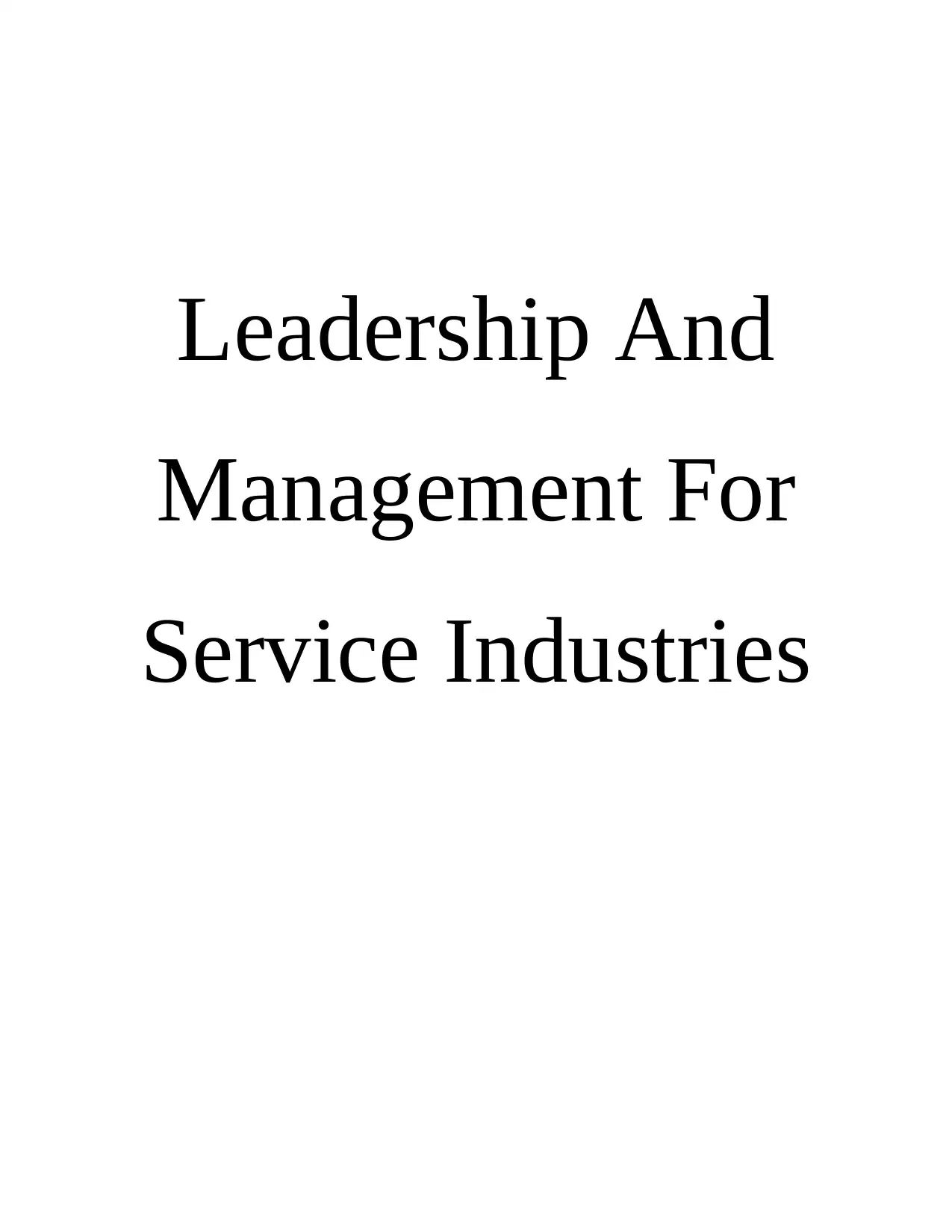
Leadership And
Management For
Service Industries
Management For
Service Industries
Secure Best Marks with AI Grader
Need help grading? Try our AI Grader for instant feedback on your assignments.
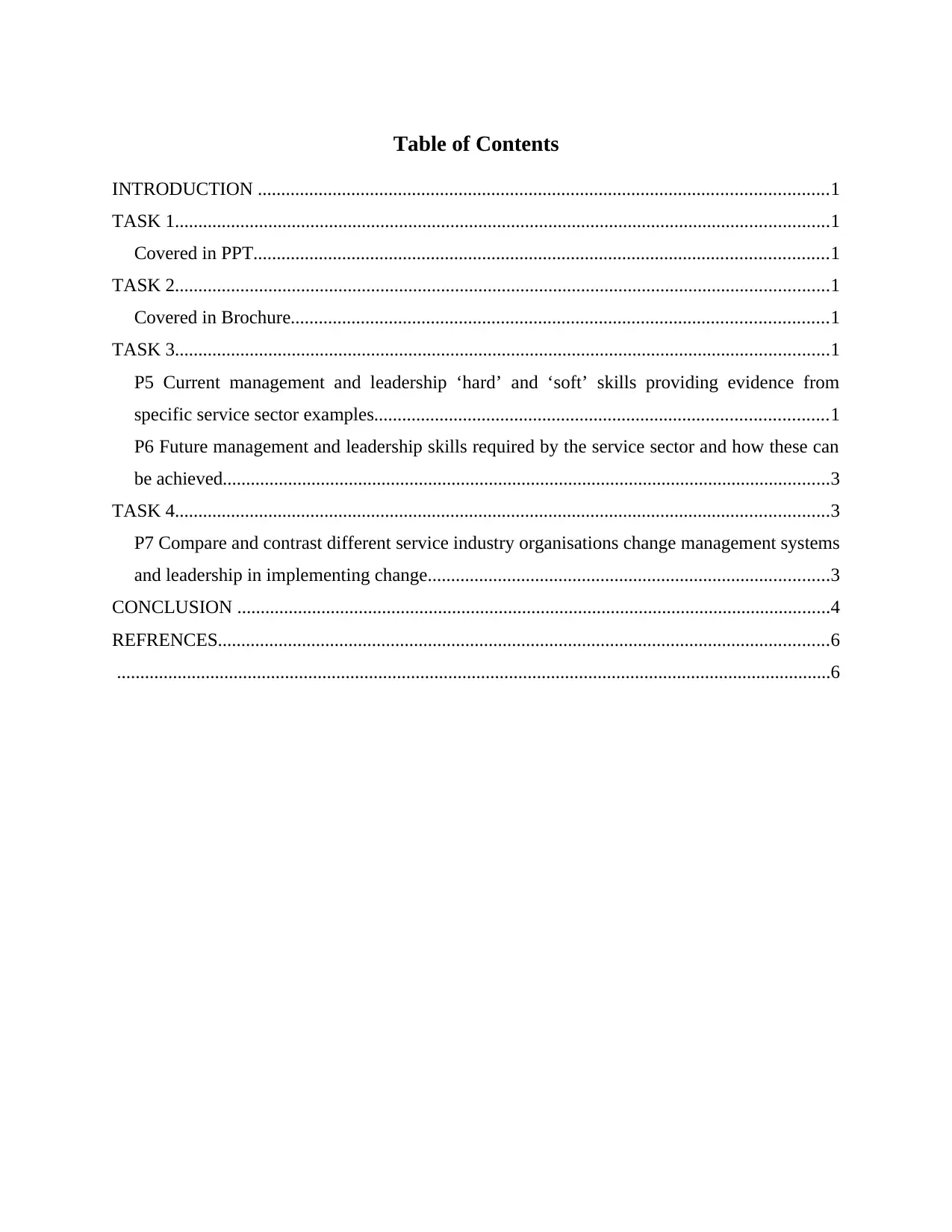
Table of Contents
INTRODUCTION ..........................................................................................................................1
TASK 1............................................................................................................................................1
Covered in PPT...........................................................................................................................1
TASK 2............................................................................................................................................1
Covered in Brochure...................................................................................................................1
TASK 3............................................................................................................................................1
P5 Current management and leadership ‘hard’ and ‘soft’ skills providing evidence from
specific service sector examples.................................................................................................1
P6 Future management and leadership skills required by the service sector and how these can
be achieved..................................................................................................................................3
TASK 4............................................................................................................................................3
P7 Compare and contrast different service industry organisations change management systems
and leadership in implementing change......................................................................................3
CONCLUSION ...............................................................................................................................4
REFRENCES...................................................................................................................................6
.........................................................................................................................................................6
INTRODUCTION ..........................................................................................................................1
TASK 1............................................................................................................................................1
Covered in PPT...........................................................................................................................1
TASK 2............................................................................................................................................1
Covered in Brochure...................................................................................................................1
TASK 3............................................................................................................................................1
P5 Current management and leadership ‘hard’ and ‘soft’ skills providing evidence from
specific service sector examples.................................................................................................1
P6 Future management and leadership skills required by the service sector and how these can
be achieved..................................................................................................................................3
TASK 4............................................................................................................................................3
P7 Compare and contrast different service industry organisations change management systems
and leadership in implementing change......................................................................................3
CONCLUSION ...............................................................................................................................4
REFRENCES...................................................................................................................................6
.........................................................................................................................................................6
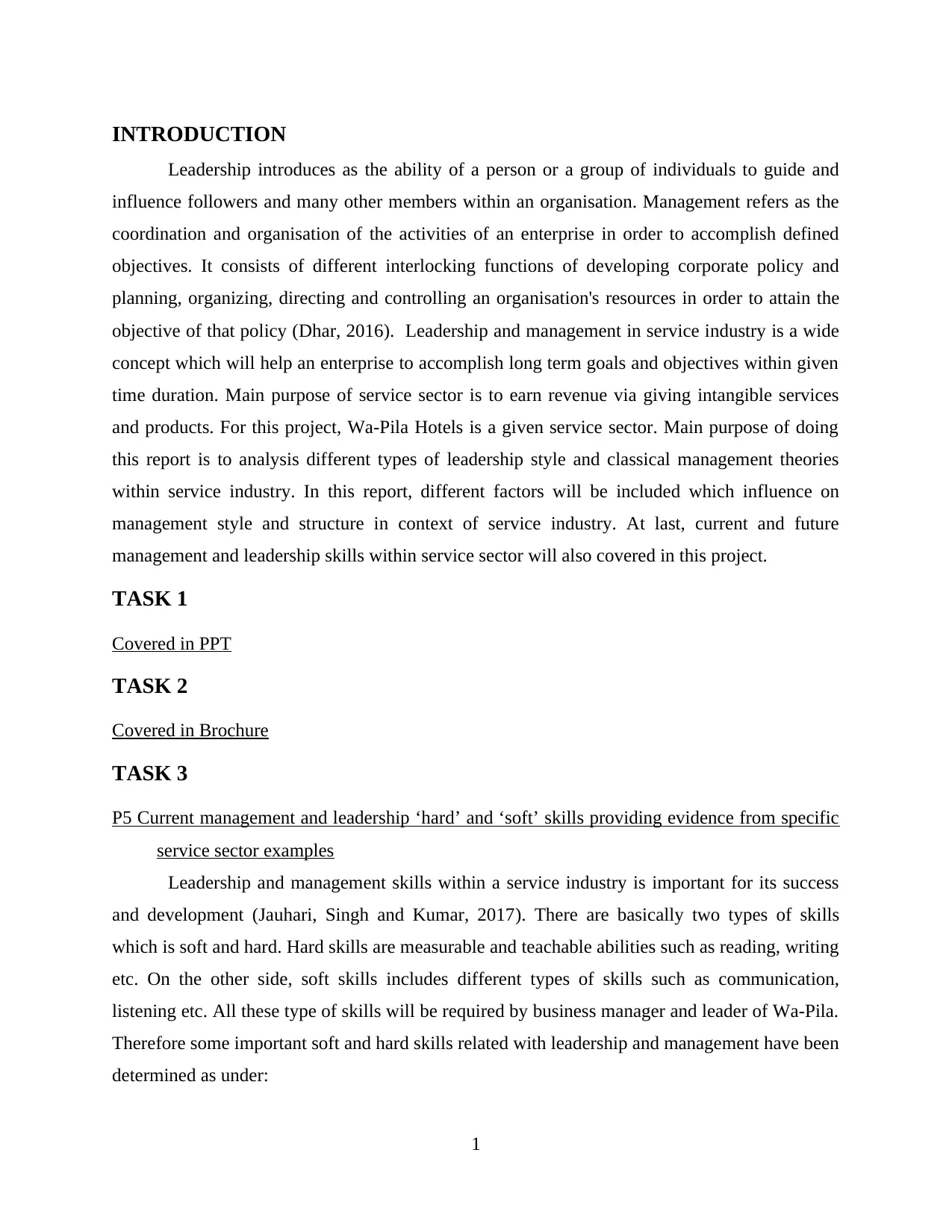
INTRODUCTION
Leadership introduces as the ability of a person or a group of individuals to guide and
influence followers and many other members within an organisation. Management refers as the
coordination and organisation of the activities of an enterprise in order to accomplish defined
objectives. It consists of different interlocking functions of developing corporate policy and
planning, organizing, directing and controlling an organisation's resources in order to attain the
objective of that policy (Dhar, 2016). Leadership and management in service industry is a wide
concept which will help an enterprise to accomplish long term goals and objectives within given
time duration. Main purpose of service sector is to earn revenue via giving intangible services
and products. For this project, Wa-Pila Hotels is a given service sector. Main purpose of doing
this report is to analysis different types of leadership style and classical management theories
within service industry. In this report, different factors will be included which influence on
management style and structure in context of service industry. At last, current and future
management and leadership skills within service sector will also covered in this project.
TASK 1
Covered in PPT
TASK 2
Covered in Brochure
TASK 3
P5 Current management and leadership ‘hard’ and ‘soft’ skills providing evidence from specific
service sector examples
Leadership and management skills within a service industry is important for its success
and development (Jauhari, Singh and Kumar, 2017). There are basically two types of skills
which is soft and hard. Hard skills are measurable and teachable abilities such as reading, writing
etc. On the other side, soft skills includes different types of skills such as communication,
listening etc. All these type of skills will be required by business manager and leader of Wa-Pila.
Therefore some important soft and hard skills related with leadership and management have been
determined as under:
1
Leadership introduces as the ability of a person or a group of individuals to guide and
influence followers and many other members within an organisation. Management refers as the
coordination and organisation of the activities of an enterprise in order to accomplish defined
objectives. It consists of different interlocking functions of developing corporate policy and
planning, organizing, directing and controlling an organisation's resources in order to attain the
objective of that policy (Dhar, 2016). Leadership and management in service industry is a wide
concept which will help an enterprise to accomplish long term goals and objectives within given
time duration. Main purpose of service sector is to earn revenue via giving intangible services
and products. For this project, Wa-Pila Hotels is a given service sector. Main purpose of doing
this report is to analysis different types of leadership style and classical management theories
within service industry. In this report, different factors will be included which influence on
management style and structure in context of service industry. At last, current and future
management and leadership skills within service sector will also covered in this project.
TASK 1
Covered in PPT
TASK 2
Covered in Brochure
TASK 3
P5 Current management and leadership ‘hard’ and ‘soft’ skills providing evidence from specific
service sector examples
Leadership and management skills within a service industry is important for its success
and development (Jauhari, Singh and Kumar, 2017). There are basically two types of skills
which is soft and hard. Hard skills are measurable and teachable abilities such as reading, writing
etc. On the other side, soft skills includes different types of skills such as communication,
listening etc. All these type of skills will be required by business manager and leader of Wa-Pila.
Therefore some important soft and hard skills related with leadership and management have been
determined as under:
1
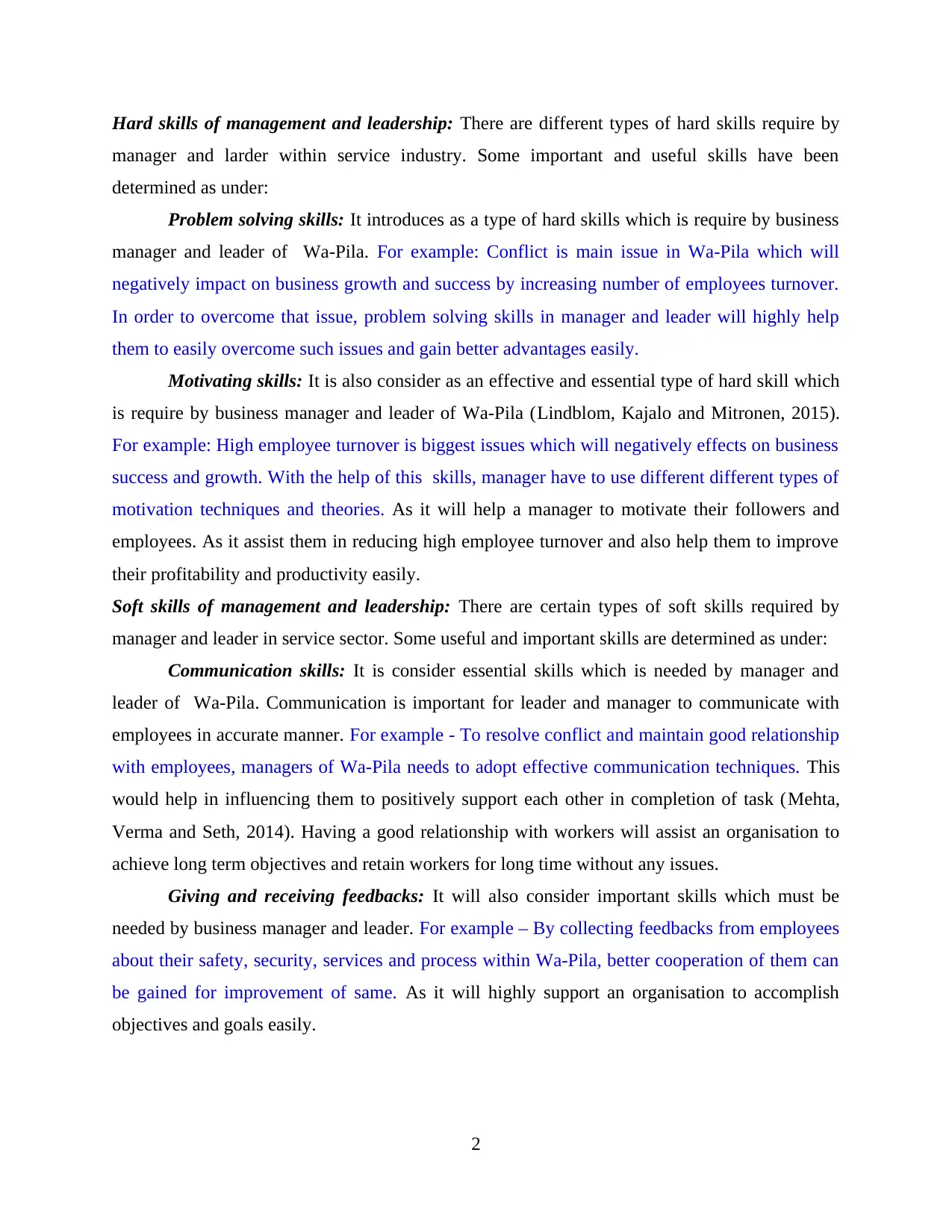
Hard skills of management and leadership: There are different types of hard skills require by
manager and larder within service industry. Some important and useful skills have been
determined as under:
Problem solving skills: It introduces as a type of hard skills which is require by business
manager and leader of Wa-Pila. For example: Conflict is main issue in Wa-Pila which will
negatively impact on business growth and success by increasing number of employees turnover.
In order to overcome that issue, problem solving skills in manager and leader will highly help
them to easily overcome such issues and gain better advantages easily.
Motivating skills: It is also consider as an effective and essential type of hard skill which
is require by business manager and leader of Wa-Pila (Lindblom, Kajalo and Mitronen, 2015).
For example: High employee turnover is biggest issues which will negatively effects on business
success and growth. With the help of this skills, manager have to use different different types of
motivation techniques and theories. As it will help a manager to motivate their followers and
employees. As it assist them in reducing high employee turnover and also help them to improve
their profitability and productivity easily.
Soft skills of management and leadership: There are certain types of soft skills required by
manager and leader in service sector. Some useful and important skills are determined as under:
Communication skills: It is consider essential skills which is needed by manager and
leader of Wa-Pila. Communication is important for leader and manager to communicate with
employees in accurate manner. For example - To resolve conflict and maintain good relationship
with employees, managers of Wa-Pila needs to adopt effective communication techniques. This
would help in influencing them to positively support each other in completion of task (Mehta,
Verma and Seth, 2014). Having a good relationship with workers will assist an organisation to
achieve long term objectives and retain workers for long time without any issues.
Giving and receiving feedbacks: It will also consider important skills which must be
needed by business manager and leader. For example – By collecting feedbacks from employees
about their safety, security, services and process within Wa-Pila, better cooperation of them can
be gained for improvement of same. As it will highly support an organisation to accomplish
objectives and goals easily.
2
manager and larder within service industry. Some important and useful skills have been
determined as under:
Problem solving skills: It introduces as a type of hard skills which is require by business
manager and leader of Wa-Pila. For example: Conflict is main issue in Wa-Pila which will
negatively impact on business growth and success by increasing number of employees turnover.
In order to overcome that issue, problem solving skills in manager and leader will highly help
them to easily overcome such issues and gain better advantages easily.
Motivating skills: It is also consider as an effective and essential type of hard skill which
is require by business manager and leader of Wa-Pila (Lindblom, Kajalo and Mitronen, 2015).
For example: High employee turnover is biggest issues which will negatively effects on business
success and growth. With the help of this skills, manager have to use different different types of
motivation techniques and theories. As it will help a manager to motivate their followers and
employees. As it assist them in reducing high employee turnover and also help them to improve
their profitability and productivity easily.
Soft skills of management and leadership: There are certain types of soft skills required by
manager and leader in service sector. Some useful and important skills are determined as under:
Communication skills: It is consider essential skills which is needed by manager and
leader of Wa-Pila. Communication is important for leader and manager to communicate with
employees in accurate manner. For example - To resolve conflict and maintain good relationship
with employees, managers of Wa-Pila needs to adopt effective communication techniques. This
would help in influencing them to positively support each other in completion of task (Mehta,
Verma and Seth, 2014). Having a good relationship with workers will assist an organisation to
achieve long term objectives and retain workers for long time without any issues.
Giving and receiving feedbacks: It will also consider important skills which must be
needed by business manager and leader. For example – By collecting feedbacks from employees
about their safety, security, services and process within Wa-Pila, better cooperation of them can
be gained for improvement of same. As it will highly support an organisation to accomplish
objectives and goals easily.
2
Secure Best Marks with AI Grader
Need help grading? Try our AI Grader for instant feedback on your assignments.
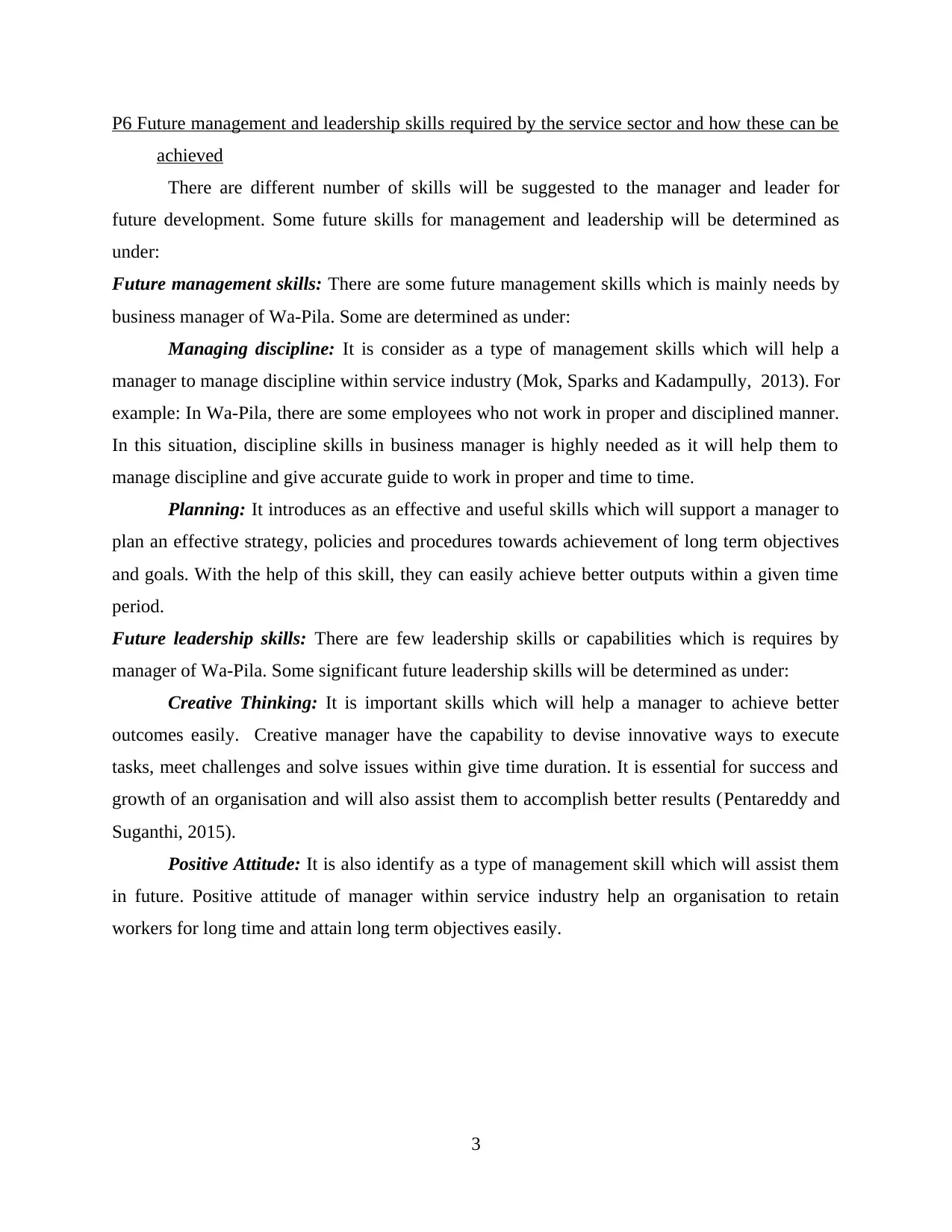
P6 Future management and leadership skills required by the service sector and how these can be
achieved
There are different number of skills will be suggested to the manager and leader for
future development. Some future skills for management and leadership will be determined as
under:
Future management skills: There are some future management skills which is mainly needs by
business manager of Wa-Pila. Some are determined as under:
Managing discipline: It is consider as a type of management skills which will help a
manager to manage discipline within service industry (Mok, Sparks and Kadampully, 2013). For
example: In Wa-Pila, there are some employees who not work in proper and disciplined manner.
In this situation, discipline skills in business manager is highly needed as it will help them to
manage discipline and give accurate guide to work in proper and time to time.
Planning: It introduces as an effective and useful skills which will support a manager to
plan an effective strategy, policies and procedures towards achievement of long term objectives
and goals. With the help of this skill, they can easily achieve better outputs within a given time
period.
Future leadership skills: There are few leadership skills or capabilities which is requires by
manager of Wa-Pila. Some significant future leadership skills will be determined as under:
Creative Thinking: It is important skills which will help a manager to achieve better
outcomes easily. Creative manager have the capability to devise innovative ways to execute
tasks, meet challenges and solve issues within give time duration. It is essential for success and
growth of an organisation and will also assist them to accomplish better results (Pentareddy and
Suganthi, 2015).
Positive Attitude: It is also identify as a type of management skill which will assist them
in future. Positive attitude of manager within service industry help an organisation to retain
workers for long time and attain long term objectives easily.
3
achieved
There are different number of skills will be suggested to the manager and leader for
future development. Some future skills for management and leadership will be determined as
under:
Future management skills: There are some future management skills which is mainly needs by
business manager of Wa-Pila. Some are determined as under:
Managing discipline: It is consider as a type of management skills which will help a
manager to manage discipline within service industry (Mok, Sparks and Kadampully, 2013). For
example: In Wa-Pila, there are some employees who not work in proper and disciplined manner.
In this situation, discipline skills in business manager is highly needed as it will help them to
manage discipline and give accurate guide to work in proper and time to time.
Planning: It introduces as an effective and useful skills which will support a manager to
plan an effective strategy, policies and procedures towards achievement of long term objectives
and goals. With the help of this skill, they can easily achieve better outputs within a given time
period.
Future leadership skills: There are few leadership skills or capabilities which is requires by
manager of Wa-Pila. Some significant future leadership skills will be determined as under:
Creative Thinking: It is important skills which will help a manager to achieve better
outcomes easily. Creative manager have the capability to devise innovative ways to execute
tasks, meet challenges and solve issues within give time duration. It is essential for success and
growth of an organisation and will also assist them to accomplish better results (Pentareddy and
Suganthi, 2015).
Positive Attitude: It is also identify as a type of management skill which will assist them
in future. Positive attitude of manager within service industry help an organisation to retain
workers for long time and attain long term objectives easily.
3
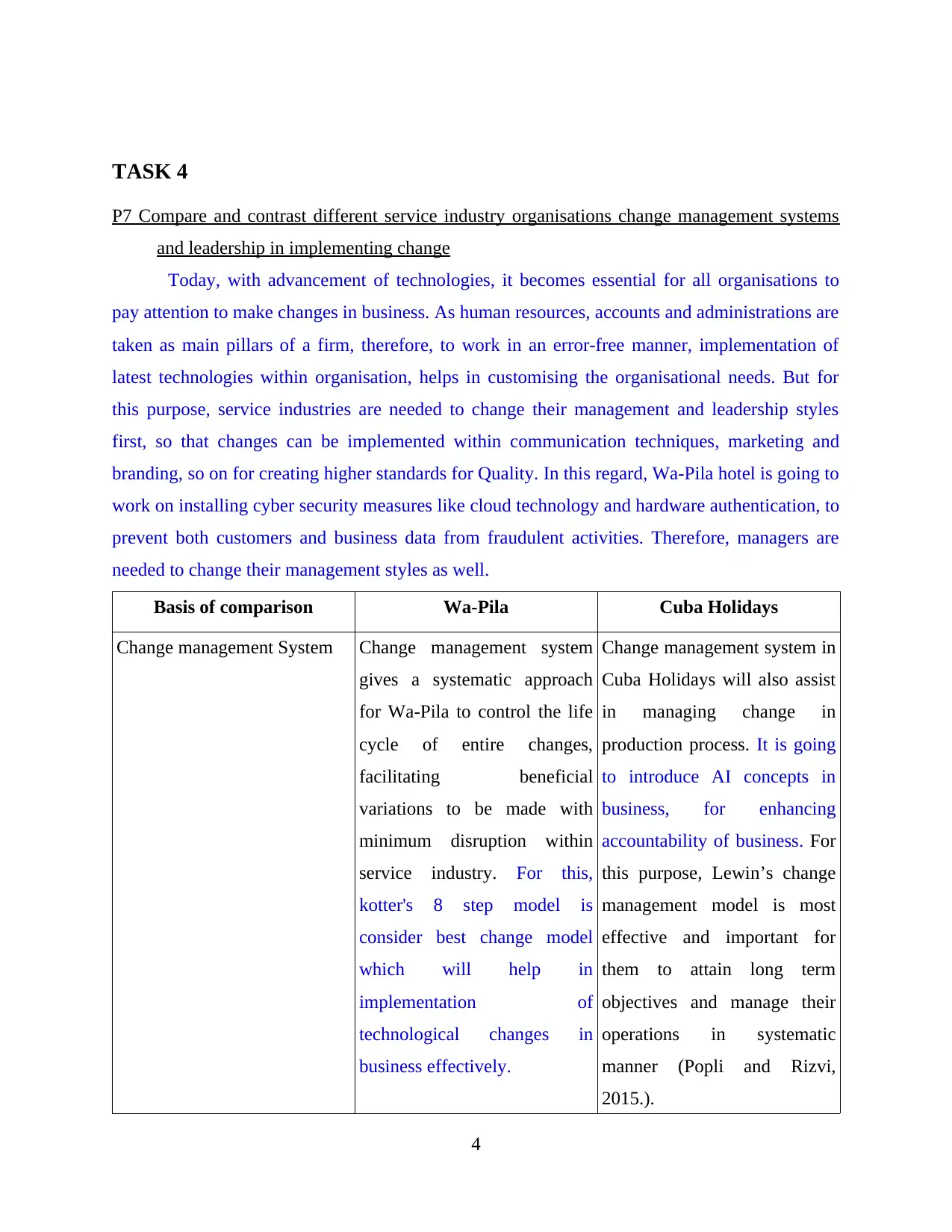
TASK 4
P7 Compare and contrast different service industry organisations change management systems
and leadership in implementing change
Today, with advancement of technologies, it becomes essential for all organisations to
pay attention to make changes in business. As human resources, accounts and administrations are
taken as main pillars of a firm, therefore, to work in an error-free manner, implementation of
latest technologies within organisation, helps in customising the organisational needs. But for
this purpose, service industries are needed to change their management and leadership styles
first, so that changes can be implemented within communication techniques, marketing and
branding, so on for creating higher standards for Quality. In this regard, Wa-Pila hotel is going to
work on installing cyber security measures like cloud technology and hardware authentication, to
prevent both customers and business data from fraudulent activities. Therefore, managers are
needed to change their management styles as well.
Basis of comparison Wa-Pila Cuba Holidays
Change management System Change management system
gives a systematic approach
for Wa-Pila to control the life
cycle of entire changes,
facilitating beneficial
variations to be made with
minimum disruption within
service industry. For this,
kotter's 8 step model is
consider best change model
which will help in
implementation of
technological changes in
business effectively.
Change management system in
Cuba Holidays will also assist
in managing change in
production process. It is going
to introduce AI concepts in
business, for enhancing
accountability of business. For
this purpose, Lewin’s change
management model is most
effective and important for
them to attain long term
objectives and manage their
operations in systematic
manner (Popli and Rizvi,
2015.).
4
P7 Compare and contrast different service industry organisations change management systems
and leadership in implementing change
Today, with advancement of technologies, it becomes essential for all organisations to
pay attention to make changes in business. As human resources, accounts and administrations are
taken as main pillars of a firm, therefore, to work in an error-free manner, implementation of
latest technologies within organisation, helps in customising the organisational needs. But for
this purpose, service industries are needed to change their management and leadership styles
first, so that changes can be implemented within communication techniques, marketing and
branding, so on for creating higher standards for Quality. In this regard, Wa-Pila hotel is going to
work on installing cyber security measures like cloud technology and hardware authentication, to
prevent both customers and business data from fraudulent activities. Therefore, managers are
needed to change their management styles as well.
Basis of comparison Wa-Pila Cuba Holidays
Change management System Change management system
gives a systematic approach
for Wa-Pila to control the life
cycle of entire changes,
facilitating beneficial
variations to be made with
minimum disruption within
service industry. For this,
kotter's 8 step model is
consider best change model
which will help in
implementation of
technological changes in
business effectively.
Change management system in
Cuba Holidays will also assist
in managing change in
production process. It is going
to introduce AI concepts in
business, for enhancing
accountability of business. For
this purpose, Lewin’s change
management model is most
effective and important for
them to attain long term
objectives and manage their
operations in systematic
manner (Popli and Rizvi,
2015.).
4
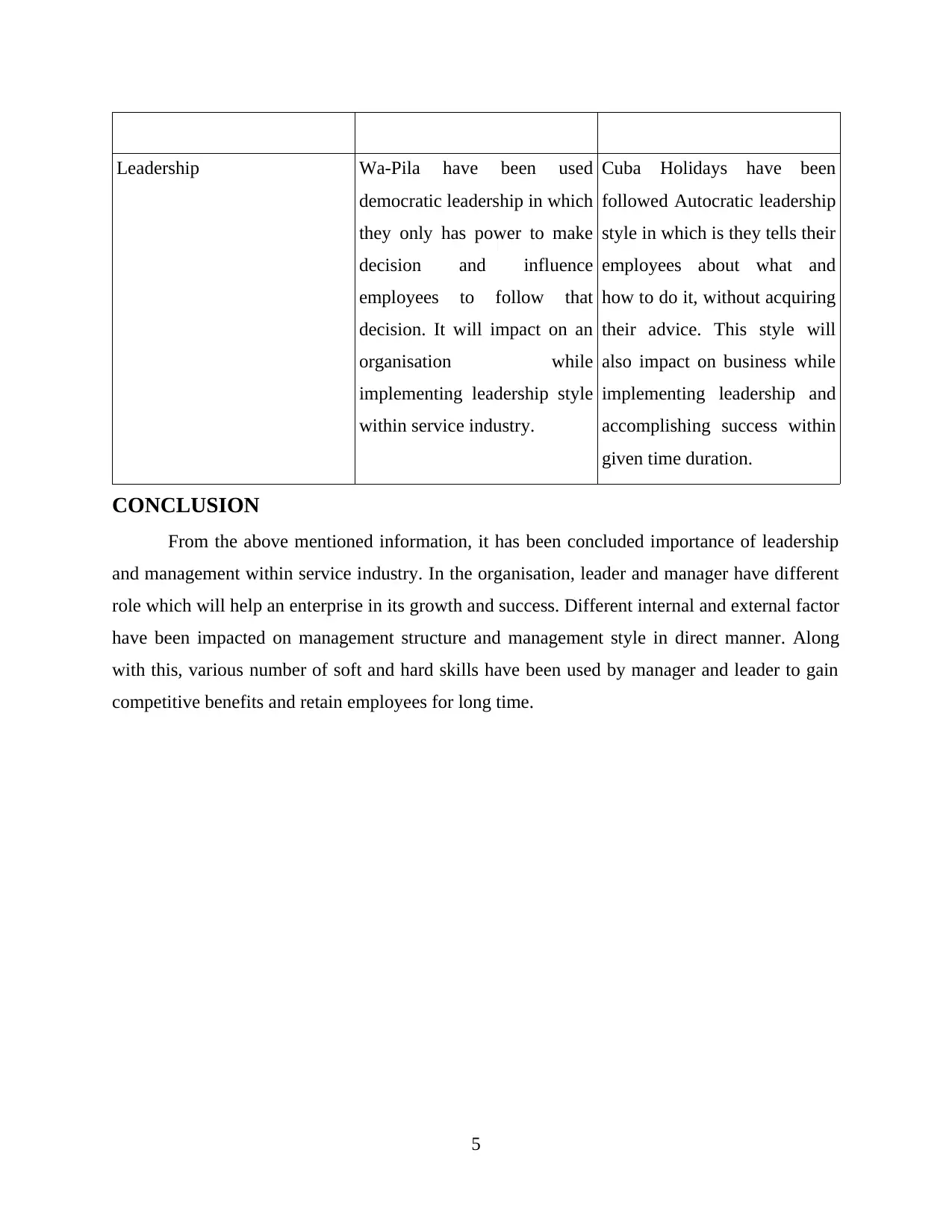
Leadership Wa-Pila have been used
democratic leadership in which
they only has power to make
decision and influence
employees to follow that
decision. It will impact on an
organisation while
implementing leadership style
within service industry.
Cuba Holidays have been
followed Autocratic leadership
style in which is they tells their
employees about what and
how to do it, without acquiring
their advice. This style will
also impact on business while
implementing leadership and
accomplishing success within
given time duration.
CONCLUSION
From the above mentioned information, it has been concluded importance of leadership
and management within service industry. In the organisation, leader and manager have different
role which will help an enterprise in its growth and success. Different internal and external factor
have been impacted on management structure and management style in direct manner. Along
with this, various number of soft and hard skills have been used by manager and leader to gain
competitive benefits and retain employees for long time.
5
democratic leadership in which
they only has power to make
decision and influence
employees to follow that
decision. It will impact on an
organisation while
implementing leadership style
within service industry.
Cuba Holidays have been
followed Autocratic leadership
style in which is they tells their
employees about what and
how to do it, without acquiring
their advice. This style will
also impact on business while
implementing leadership and
accomplishing success within
given time duration.
CONCLUSION
From the above mentioned information, it has been concluded importance of leadership
and management within service industry. In the organisation, leader and manager have different
role which will help an enterprise in its growth and success. Different internal and external factor
have been impacted on management structure and management style in direct manner. Along
with this, various number of soft and hard skills have been used by manager and leader to gain
competitive benefits and retain employees for long time.
5
Paraphrase This Document
Need a fresh take? Get an instant paraphrase of this document with our AI Paraphraser
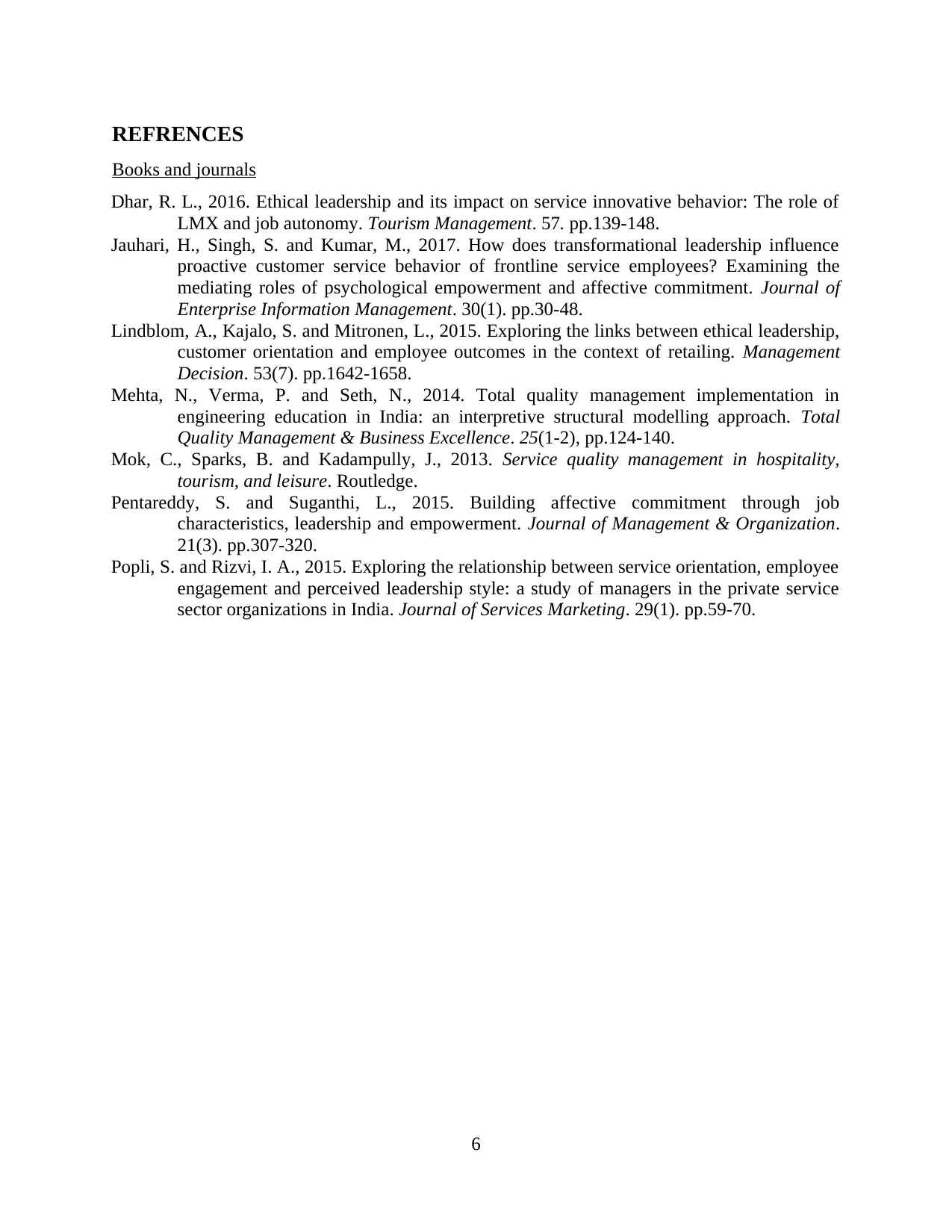
REFRENCES
Books and journals
Dhar, R. L., 2016. Ethical leadership and its impact on service innovative behavior: The role of
LMX and job autonomy. Tourism Management. 57. pp.139-148.
Jauhari, H., Singh, S. and Kumar, M., 2017. How does transformational leadership influence
proactive customer service behavior of frontline service employees? Examining the
mediating roles of psychological empowerment and affective commitment. Journal of
Enterprise Information Management. 30(1). pp.30-48.
Lindblom, A., Kajalo, S. and Mitronen, L., 2015. Exploring the links between ethical leadership,
customer orientation and employee outcomes in the context of retailing. Management
Decision. 53(7). pp.1642-1658.
Mehta, N., Verma, P. and Seth, N., 2014. Total quality management implementation in
engineering education in India: an interpretive structural modelling approach. Total
Quality Management & Business Excellence. 25(1-2), pp.124-140.
Mok, C., Sparks, B. and Kadampully, J., 2013. Service quality management in hospitality,
tourism, and leisure. Routledge.
Pentareddy, S. and Suganthi, L., 2015. Building affective commitment through job
characteristics, leadership and empowerment. Journal of Management & Organization.
21(3). pp.307-320.
Popli, S. and Rizvi, I. A., 2015. Exploring the relationship between service orientation, employee
engagement and perceived leadership style: a study of managers in the private service
sector organizations in India. Journal of Services Marketing. 29(1). pp.59-70.
6
Books and journals
Dhar, R. L., 2016. Ethical leadership and its impact on service innovative behavior: The role of
LMX and job autonomy. Tourism Management. 57. pp.139-148.
Jauhari, H., Singh, S. and Kumar, M., 2017. How does transformational leadership influence
proactive customer service behavior of frontline service employees? Examining the
mediating roles of psychological empowerment and affective commitment. Journal of
Enterprise Information Management. 30(1). pp.30-48.
Lindblom, A., Kajalo, S. and Mitronen, L., 2015. Exploring the links between ethical leadership,
customer orientation and employee outcomes in the context of retailing. Management
Decision. 53(7). pp.1642-1658.
Mehta, N., Verma, P. and Seth, N., 2014. Total quality management implementation in
engineering education in India: an interpretive structural modelling approach. Total
Quality Management & Business Excellence. 25(1-2), pp.124-140.
Mok, C., Sparks, B. and Kadampully, J., 2013. Service quality management in hospitality,
tourism, and leisure. Routledge.
Pentareddy, S. and Suganthi, L., 2015. Building affective commitment through job
characteristics, leadership and empowerment. Journal of Management & Organization.
21(3). pp.307-320.
Popli, S. and Rizvi, I. A., 2015. Exploring the relationship between service orientation, employee
engagement and perceived leadership style: a study of managers in the private service
sector organizations in India. Journal of Services Marketing. 29(1). pp.59-70.
6
1 out of 8
Related Documents
Your All-in-One AI-Powered Toolkit for Academic Success.
+13062052269
info@desklib.com
Available 24*7 on WhatsApp / Email
![[object Object]](/_next/static/media/star-bottom.7253800d.svg)
Unlock your academic potential
© 2024 | Zucol Services PVT LTD | All rights reserved.





